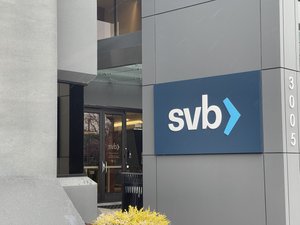The Covid-19 pandemic created a boom for Tampa Bay area technology companies. Many had year-over-year growth that previously took five years to achieve; funding wins came in a wave; sky-high valuations were reached, and founders started their next ventures.
That success waned in 2022 across the nation.
"You saw this explosive growth in the matter of a year where the Nasdaq doubled and business was thriving," said Sean Snaith, director of the Institute for Economic Forecasting and a professor at University of Central Florida. "Because of the explosive growth coming out of the lockdown, there was a bit of overshooting in the tech space. Some of it is sort of a chickens coming home to roost for that explosive and excessive growth during a short amount of time."

But despite national concerns, Florida — just like with the pandemic — seems to be bucking the trend.
In 2022, the state raised $6.8 billion, up from $6.6 billion in 2021, according to PitchBook. That's a stark contrast from 31% drop in venture capital funding across the nation.
The Sunshine State is also offset by the thousands of people moving to the state each day.
"Really ever since Covid, we’ve been almost riding a wave here," said Rafael Lohner, executive director of the Institute for Commercialization of Florida Technology. "We have so much talent coming in from other places across the world; we’ve had a lot of investors move here and ... people tend to support their local environment. [The moves] help us offset the doom and gloom we’ve been having."

Part of that "doom and gloom" is the domino effect from layoffs at larger companies like Facebook's Meta and Google's Alphabet, an overcorrection after aggressive hiring in 2021.
"[It becomes], 'Other people have done it, so it's OK for me to let people go,'" said Mark McDonald, a fellow and distinguished vice president at Gartner. "It doesn’t make it OK and you would hope no one would be let go on a whim. But it's politically OK to take those actions."

Despite some expected roadblocks, the tech sector is largely solid, McDonald believes. He stated business-to-business and enterprise sectors will largely be OK while consumer-facing companies, known as business-to-consumer, may hit some roadblocks.
The sector should come out on top, he said.
"Tech has proven to be pretty resilient and pretty adaptive," he said. "So I wouldn't necessarily bet against it over the long term. It doesn’t mean there aren't short-term pains and that tech isn’t in a short-term pain right now."
Snaith is a bit more cautious, pointing toward the dot-com burst in the late 1990s after investments in internet-based companies skyrocketed.
"I'm old enough to remember 2001 where pretty much everyone thought nothing could go wrong with tech and low and behold it did," Snaith said. "It's a shiny sector; it's not like concrete or making roof shingles, it's a little more of a glamour sector of the economy. So I think sometimes people get caught up in it, especially those that get involved."
The Tampa Bay Business Journal asked experts from innovation hubs, legal firms and investment funds to weigh in on what startups should be doing to stay on track.
Ask the expert: Tampa Bay heavyweights on what startups should do during a downturn
Richard Munassi, cohort director at the Tampa Bay Wave

As the VC funding landscape shifts during an economic downturn it's imperative for startups to execute on three key things:
- Detail a path to profitability in the financial model/projections and execute on that plan
- Increase efficiency of spend to maximize runway
- Ensure longer sales cycles or decreased sales opportunities are mitigated to maintain velocity
Lakshmi Shenoy, CEO at Embarc Collective

Focus on the fundamentals: Don't get distracted by the noise of what your competitors are doing when there is looming economic uncertainty. Stay laser-focused on the fundamentals: customers, cash flow and team. A downturn can be a time of tremendous opportunity for companies who have nailed product-market fit. The goal is to be indispensable to your target customers, so your offering isn't a casualty of their cost-cutting.
Focus on your customer: When you're early-stage and seeking product-market fit, stay focused on listening to your target customer. Immerse yourself in their world to fully understand their pain points; it's tempting to skip the customer discovery process when there is an urgency to convert prospects to paying customers.
Saxon Baum, partner at Florida Funders

Downturns are hard for investors and entrepreneurs but present unique opportunities. On the investor side of the house, investors will have to wait longer for liquidity, but investors are also seeing better valuations. On the entrepreneur's side of the house, this time is a time when you need to hunker down and make sure that all of your spending is necessary. This is a great time to evaluate your total operation and really have your eye on the bottom line, try to expand margins, and start making money.
Brent Britton, founder and chairman at CoreX Legal

Facing stormy economic seas presents challenges for all businesses, but startups can sometimes prepare and respond more nimbly than larger enterprises. Here are some steps for every startup to consider as we approach the prospect of financial hardship:
- Evaluate cash flow realistically. The math doesn’t lie and cannot be ignored; you cannot spend what you do not have. Don’t be ruthless, but try to identify all areas where cost reduction is possible, preferably without compromising the company’s core functions.
- Consider reducing attention to new developments or features and focusing on selling the product or service you have on hand.
- Treat existing customers extremely well. Consider investing in support and loyalty programs for current customers. Retaining them is easier than dealing with the rising costs of new customer acquisition during an economic slump.
- Identify possible strategic alliances and partnerships with complementary providers to generate additional revenue.
- Pivot. Consider the possibility of new offerings or markets occasioned by changing market conditions.
- Keep seeking funding. If your business is viable and undergirded by meaningful market validation, investors will still take an interest, even in bleak times. But be sure to retain competent legal counsel to help you avoid predatory investment deals.
Finally, remember that you are not alone. In a recession, everyone around you will be considering austerity measures, cuts, and layoffs. We’re all in this together.
Andreas Calabrese, partner at TampaBay.Ventures

I would not rely on being able to buy growth; the cost of capital is very, very high for companies at the moment. If interest rates continue to stay high that'll continue. At least at current, most venture funds and venture investors are still investing in capital raised n 2018, 2019 and maybe early 2020. In the next six to 12 months, those funds will invest capital that was raised in the middle of the pandemic — which likely means there will be less capital available.
My advice to startup founders would be to extend your runway as much as possible, which is fairly generalist advice. So what does that actually mean? It means embracing automation much more; not using human capital to solve as many problems. Targeting more defined niches where you don't have to expel as many resources on customer discovery or user discovery. And outside of that, I would say you have to be a bit scrappy. We're already in a slightly underfunded ecosystem compared to other places, so creativity and resourcefulness are really what's going to work.








